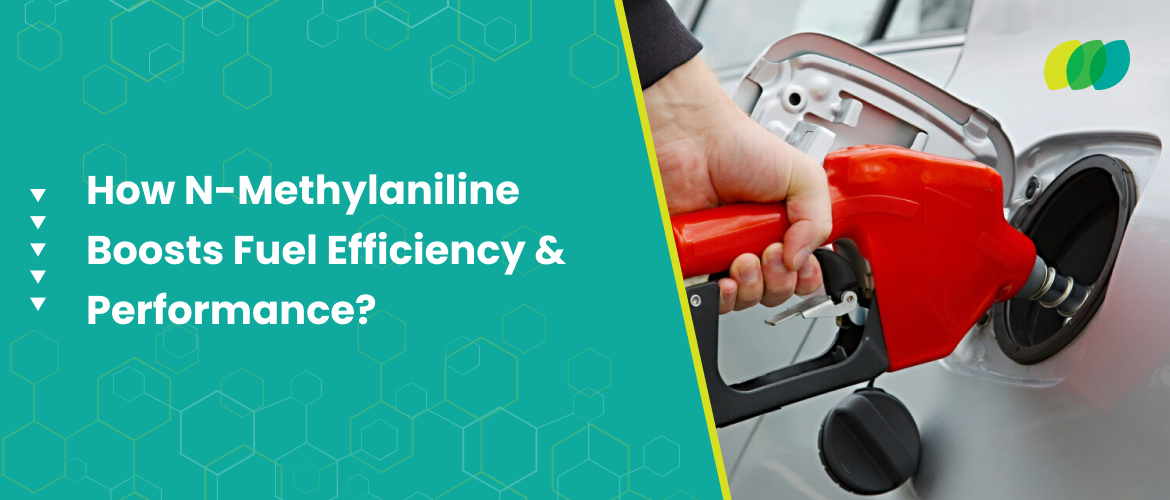In this modern world, fuel efficiency is not just a trend– it’s a necessity. With the increasing fuel prices and rising environmental concerns, industries are now finding ways that can help them with fuel efficiency while minimizing emissions.
One of the most effective fuel additives that has attracted a lot of attention today is N-Methylaniline. It is a powerful compound that plays an important role in improving combustion efficiency. Apart from it, N-Methylaniline also helps increasing octane ratings and optimizing overall fuel performance.
In this blog, we will see how N-Methylaniline is so effective and also discuss the science behind this fuel additive.
Understanding N-Methylaniline
N-Methylaniline is an organic compound derived from Aniline. It is widely used as an octane booster and combustion in gasoline and diesel. By changing the chemical composition of fuel, NMA promotes more complete combustion, improving efficiency.
How N-Methylaniline Enhances Fuel Performance
1. Boosts Octane Rating
The addition of N-Methylaniline to gasoline boosts octane rating which leads to diminished engine knock and enhances smoother engine operation. The fuel combustion efficiency improves with increased octane number values thus protecting the engine parts from damage.
2. Improves Combustion Efficiency
NMA promotes complete fuel combustion, maximizing energy output and reducing waste. The power output increases, and unburned hydrocarbons and carbon deposits decrease inside the engine.
3. Reduces Harmful Emissions
The process of incomplete combustion produces carbon monoxide (CO) with nitric oxide (NOx) as harmful emission products. N-methyl aniline reduces fuel-related emissions by promoting effective fuel oxidation making it an environmentally compliant fuel additive.
4. Enhances Fuel Stability
The aging process through degradation together with oxidation of fuel causes performance deterioration and inefficiency. The chemical substance NMA functions as an agent that stabilizes fuels against degradation while maintaining engine stability throughout storage periods.
N-Methylaniline vs Generic Additives
| Feature | N-Methylaniline | Conventional Additives |
| Octane Boosting Power | High | Moderate |
| Combustion Efficiency | Enhanced | Average |
| Emission Control | Significant Reduction | Limited Reduction |
| Fuel Stability | Excellent | Moderate |
| Engine Performance | Optimized | Standard |
| Environmental Impact | Lower Emissions | Variable |
| Cost-Effectiveness | High | Variable |
Why Industries Favor N-Methylaniline against Conventional Octane Boosters?
As industries aim for sustainable performance & competitive edge, selecting the right additive is an important decision. Here is what makes N-Methylaniline unique:
1. Customization for Fuel Blends
NMA, unlike other commercially available additives, is highly customizable to fit the makeup of particular fuel blends, both specialized and commercial.
2. Enhanced Fuel Logistics
NMA-modified fuels have greater storage stability and lower volatility which means they are more convenient to transport and store, thus lowering logistical risks and losses.
3. Meeting Company Policies
NMA enables businesses to comply with more stringent environmental and performance policies.
4. Compatibility with Modern Engines
High compression modern engines can use NMA as it provides better responsiveness while still protecting the warranty, avoiding compromise to the engine design.
5. Rise in Demand Globally
As more regions adopt advanced fuel standards, NMA is gaining traction globally – making it a smart, future-proof additive for fuel producers and users alike.
Safety and Handling Considerations
The handling requirements for N-Methylaniline need strict attention because of its many advantages. Contact with N-Methylaniline will cause eye and skin problems while prolonging respiratory life. Users must follow all storage and use guidelines, as this practice enables the right safety measures during transport and handling.
Conclusion
The additive N-Methylaniline presents an extraordinary success in pursuing fuel efficiency with better motor functions in modern applications. The permanent approach to modern fuel requirements stems from a better combustion process by checking the octane price while controlling engine emissions. Growth in industry depends on NMA, as it shows promise in improving both fuel efficiency and quality standards.

